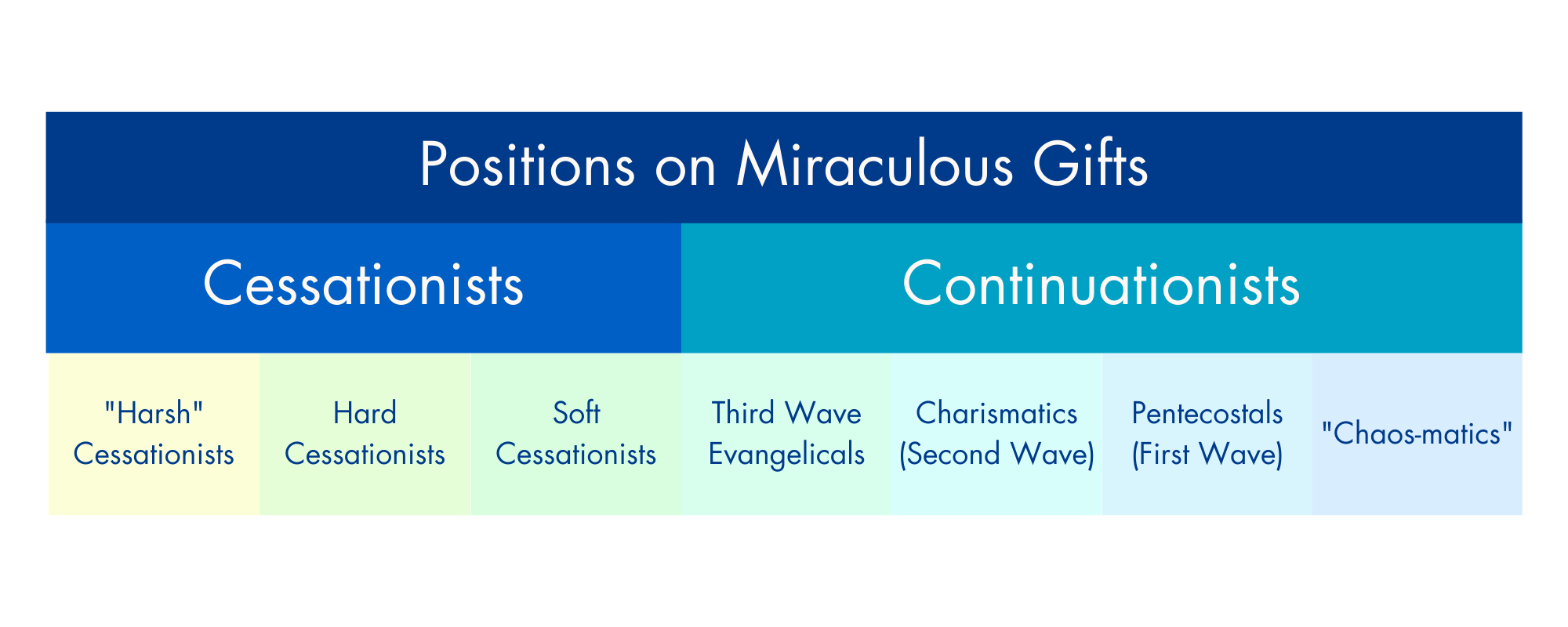All Christians must reckon with spiritual gifts in their Bibles. Lists in 1 Corinthins 12:7–10, 1 Corinthians 12:28, Romans 12:6–8, and 1 Peter 4:10–11 name various gifts while passages throughout the New Testament depict them at work.
What are spiritual gifts?
Spiritual gifts, according to Paul, are “manifestations of the Spirit” given to all for the common good (1 Cor 12:7 NIV). Sam Storms defines gifts as “capacities or abilities imparted to Christians by the Holy Spirit to enable them to exceed the limitations of their finite humanity in order to serve other believers to the glory of God.”1 These manifestations of God’s Spirit in and through us represent “God going public among His people.”2
What is a continuationist? What is a cessationist?
Some divide gifts into non-miraculous (teaching, mercy, etc.) and miraculous (tongues, exorcism, healing, prophecy, etc.) categories. Two views on miraculous gifts exists: continuationists and cessationists.
- Continuationists believe all spiritual gifts continue today.
- Cessationists believe spiritual gifts in the miraculous category have ceased.
The difference matters. D. A. Carson warns that young clergy will wrestle with these issues “as frequently and in some instances as painfully” as anything they face.3 Paul commands us to follow the way of love and “eagerly desire gifts of the Spirit, especially prophecy” (1 Cor 14:1 NIV), a command repeatedly supported (1 Cor 14:39; Rom 12:6; 1 Thess 5:19–22). If these gifts have not ceased, failing to seek them risks violating biblical commands.
A conclusion should result from close Bible study and listening to responsible representatives from both sides.
Flavors of continuationists and cessationists
While a clear dividing line exists between camps, each is internally more complex. I add a few categories to Wayne Grudem’s:
- Cessationists
- “Harsh” Cessationists
- Hard Cessationists
- Soft Cessationists
- Continuationists
- Third Wave Evangelicals
- Charismatics (Second Wave)
- Pentecostals (First Wave)
- “Chaos-matics”

Cessationist views
Notable cessationists include:
- J. I. Packer
- Gerald Bray
- Richard Gaffin
- Norman Geisler
- Dan Wallace
- B. B. Warfield
- Vern Poythress
Cessationists disagree over which gifts have ceased, when and why they’ve ceased, the firmness of their cessationism, and the attitude they take towards continuationists.
- Soft cessationists admit they could easily be wrong and recognize much good in the charismatic movement.
- Hard cessationists are more sure of their position and suspicious of the whole charismatic movement.
- “Harsh” cessationists are certain of their position and condemn the charismatic movement wholesale.
Soft cessationism is ably represented by Tom Schreiner.4 Hard cessationism is well-known through speakers and authors connected to the Strange Fire Conference,5 (some of whom would fall into my “harsh” category).
Some cessationists may object to a taxonomy dividing “harsh” from hard cessationists. I see a line between them in both their firmness and their treatment of charismatics.
Continuationist views
Notable continuationists include:
- D. A. Carson
- Andreas Köstenberger
- John Piper
- Wayne Grudem
- Craig Keener
- Sam Storms
- Gordon Fee
Continuationists disagree about how some gifts are understood and who should exercise them.
Pentecostals
The early twentieth century Pentecostal movement or “First Wave” of renewal sees Spirit baptism as separate from and subsequent to conversion, for all, with the gift of tongues as initial evidence of the baptism. The Assemblies of God is an example,6 represented by scholars like Gordon Fee (who debates the usefulness of this terminology).7
Charismatics
The doctrines of subsequence and initial evidence were rejected by the broader charismatic renewal movement that began in the 1960s and 70s. Adherents of this “Second Wave” rapidly multiply in every corner of global Christianity today.
Third Wave evangelicals
Third Wave evangelicalism, a renewal movement beginning in the 1980s, emphasizes signs and wonders as accompanying gospel proclamation. Prominently associated with John Wimber, this movement is ably represented today by theologians like Wayne Grudem or conferences like Convergence.
“Chaos-matics”
Some continuationists may object to a taxonomy including “Chaos-matic” on the continuationist side. Most other continuationists dissociate from the doctrines and practices at these extremes. However, a category should arguably exist for what most acknowledge to be blatant disregard of biblical teachings. Sadly, some leaders who believe in the gifts of the Spirit use those gifts in an openly hucksterish fashion. Others put on events that descend into near madness, flouting the command—given precisely in the famous spiritual gifts passage of 1 Corinthians 14—to do all things “decently and in order.”
Open but cautious = not yet decided
Between these views lie the “open but cautious,” perhaps representing most US evangelicals—who have been convinced by neither “the cessationist arguments” nor “the doctrine or practice of those who emphasize [miraculous] gifts today.”8 This group is “simply undecided,”9 and has been occasionally described as continuationist in theology but cessationist in practice, though in reality fitting into nether of what can only be two positions.
First Corinthians 14:1 illustrates the dichotomy. The command to eagerly desire prophecy is either in force or it is not. If not in force, it should be ignored. If in force, it cannot be. No third option exists. “Open but cautious” should thus be seen not as a destination but as a waypoint between positions.
Which gifts are disputed?
Different people place different gifts in the debated category. Most include at least healing, prophecy, and tongues. Continuationists usually see “apostles” with the authority of Peter or New Testament authors as an office, not a gift, and acknowledge that apostleship in this sense no longer remains.
Healing
Cessationists commonly hold that miraculous healing still takes place but that the gift of healing has ceased. A person with this gift can heal any sickness, anywhere, at any time. This healing is always successful and complete,10 as they possess “the miraculous, God-given ability to immediately heal people in the same way as Christ and His apostles.”11
Continuationists normally disagree. While it is true that in some Chaosmatic circles, self-proclaimed “faith healers” promise healing to any and all who have faith, and manipulatively blame remaining illness on its absence, most continuationists understand the gift in less dramatic terms that are less conducive to such abuses. Healing isn’t promised to all in this age who have faith. New Testament healing rather operates under God’s sovereignty such that while “a great number of disabled people” might have lain sick at the pool of Bethesda (John 5:3 NIV), only one walked away healed. Jesus did not “empty the hospital,” so to speak, because that was not God’s purpose that day.
First Corinthians 12:9, 28, and 30—the only places the gift is named—speak of “gifts” (plural) and of “healings” (plural), but never in the singular. As D. A. Carson argues, this suggests that “not everyone was getting healed by one person” and that perhaps “certain persons with one of these gifts of healing could by the Lord’s grace heal certain diseases or heal a variety of diseases but only at certain times.”12
For Sam Storms there is “no such thing as the spiritual gift of healing. There never has been and never will be.”13 He rejects the notion that if someone could ever heal, they could always heal. Rather, the New Testament displays lingering illness in Epaphroditus (Phil 2:25–30), Timothy (1 Tim 5:23), Trophimus (1 Tim 4:20) and possibly Paul himself (2 Cor 12:7–10; Gal 4:13), suggesting that this gift operates at the will of the gifting God rather than the gifted human. Healings are thus “occasional and subject to the sovereign purposes of God.”14
Prophecy
Tom Schreiner defines prophecy as the infallible “reception of spontaneous revelations that are communicated to God’s people.”15 Some see preaching superseding an originally revelatory gift of prophecy; others equate them completely. Most cessationists identify Old Testament and New Testament prophecy as having authority equal to Scripture, with no tiers.16 If prophecy is continuing, shouldn’t it be added to our Bibles?
Some Chaosmatics claim to receive universally binding prophetic words. Most continuationists, however, understand prophecy in more muted terms and agree that modern day prophetic utterances are not on par with Scripture. None are adding pages to their Bibles.
Some distinguish Old Testament prophecy from that in the New Testament, which is less authoritative.17 Gregg Allison and Andreas Köstenberger argue that both the Old and New Testaments have two categories:
One is authoritative or foundational prophecy (e.g., “Thus says the Lord”; the church is “built on the foundation of the apostles and prophets,” Eph 2:20), the second is non-authoritative or non-foundational prophecy (e.g., that which was communicated by the unclothed, seemingly mad Saul, 1 Sam 19:24; that which was communicated by the four virgin daughters of Philip, Acts 21:9).18
Sam Storms identifies three elements in every “prophetic utterance”:
- The divine revelation from the Spirit, always inspired and infallible
- The human interpretation of what that revelation means
- The application to the person(s) involved19
All evangelicals affirm that Scripture is inspired, infallible revelation. Most admit that their interpretations and applications sometimes err. Perhaps by analogy we can acknowledge that the revelation in the gift of prophecy is always infallible, while interpretations and applications are not.20
One common cessationist concern is that revelatory prophecy threatens Scripture’s sufficiency. If the church needs continuing revelation beyond Scripture, how can it hold Scripture high? Continuationists reply that this gift, understood biblically, can pose no such threat, since New Testament prophecy doesn’t yield Scripture-quality words.21
Within the New Testament, prophecy arguably weighs in at a lower division. Paul requires a first prophet speaking revelation to yield, unfinished, to a second, apparently indifferent to the revelation being lost by the interruption (1 Cor 14:29–33). He recognizes legitimate prophecy at Corinth and urges more (1 Cor 12:31), yet subordinates prophetic to apostolic authority (1 Cor 14:37–38).
Prophetic utterances are tested or “weighed” (1 Thess 5:19–21; 1 Cor 14:29), the word Paul uses suggesting “that the prophecy be evaluated, not simply accepted as totally true or totally false.22 Prophecy in the New Testament, Carson concludes, “cuts a very low profile,”23 such that Paul must inform the Thessalonians not to treat it with contempt (1 Thess 5:20) and must advance its cause over tongues (1 Cor 14), realities sitting uncomfortably with a notion of prophecy as Scripture-quality revelation.
Perhaps cessationists should beware of holding prophecy in contempt and continuationists should beware of testing it inadequately (1 Thess 5:19–24).
Tongues
Cessationists typically hold that tongues are always known human languages: they should accord with the biblical pattern in Acts 2 as understandable, “horizontal” (human-to-human) speech. Continuationists counter that the New Testament speaks repeatedly of “different kinds of tongues” (1 Cor 12:19–20, 28), suggesting diverse manifestations.
Debate remains over whether the speaker of tongues himself always understands what he says and to whom he speaks. Some suggest an unlearned language is spoken which anyone knowing thus understands, but this poses difficulties with the need for a gift of interpretation (1 Cor 12:10, 30; 14:12, 26; 14:27).
Pentecostals, I noted above, diverge from other continuationists in their understanding of the gift of tongues’ scope and purpose. Some on the right fringe of the spectrum divorce the experience from cognitive content (that is, they believe that tongues are essentially gibberish). Closer to the center of the spectrum, all agree that there is cognitive content expressed and that tongues is given at the Spirit’s sovereign dispensation rather than unilaterally.
A growing number of continuationists see tongues as primarily a private prayer language, normally with vertical (human-to-God) rather than horizontal content—conclusions typically rejected by cessationists. These continuationists argue several points:
- Paul practiced tongues often (1 Cor 14:18) in private prayer (1 Cor 14:14), distinguishing this from its use in the assembly (1 Cor 14:19), where it requires interpretation.
- Paul distinguishes praying in tongues from understanding (1 Cor 14:14–16) and describes the content as mysteries (1 Cor 14:2), suggesting ignorance of its content.
- Paul identifies God as spoken to (1 Cor 14:14, 15, 16, 17), and no New Testament reference unambiguously describes tongues as horizontal speech to humans, though Acts 2, 10, and 19 are often read that way.
Craig Keener, while acknowledging that tongues might function horizontally, concludes with Carson that the biblical emphasis “is clearly on Spirit-led prayer.”24
What Are the Best Arguments for Cessationism?
1. Tie miraculous gifts uniquely to the apostles or associates as the sign of their apostleship (Matt 10:1–2; Acts 2:43; 2 Cor 12:12)
If miraculous gifts are the unique sign of apostles, who had to physically witness the resurrected Christ (Acts 1:22; 10:39–41; 1 Cor 9:1; 15:7–8) and be personally appointed by him (Mark 3:14; Luke 6:13; Acts 1:2, 24; 10:41; Gal 1:1), then they cannot continue after the death of the apostles.
2. Regard the purpose for the miraculous gifts as temporary
Here, the gifts are usually understood as a foundation for the church (Eph 2:19–20) and authentication of either the apostolic message (1 Cor 12:12; Heb 2:3–4), the giving of Scripture, or both. If their function was temporary, then they ceased with that function.
3. Observe that the gifts have largely disappeared from church history
If some groups or individuals occasionally claimed them, they were not consistently practiced by all; these are aberrations. Further, some of the groups who claimed them were doctrinally heterodox at best and should not serve as an example to follow.
What Are the Best Arguments for Continuationism?
1. Show the gifts exercised by non-apostles
Storms counts the seventy in Luke 10:9, 19–20; 100+ gathered at Pentecost in Acts 2; Stephen in Acts 6–7; Philip in Acts 8; Ananias in Acts 9; church members in Antioch in Acts 13:1–3, Ephesus in Acts 19:6, Caesarea in Acts 21, Galatia in Galatians 3:5, Rome in Romans 12:6–8, Corinth in 1 Corinthians 12–14; and Thessalonica in 1 Thessalonians 5:19–20. If such non-apostles regularly exercised them, they cannot be uniquely tied to the apostles.
2. Identify a continuing purpose beyond authentication or foundation (Eph 2:19–20)
While not denying that miraculous gifts served these purposes, if there are additional purposes for them that continue (for example, edifying the church; 1 Cor 12:7;14:3, 26), then the gifts continue.
3. See them as exercised throughout history
Further, absence of charismatic activity in some periods wouldn’t mean God disapproves of such activity. An absence of Protestant missions prior to its “father,” William Carey, was spurred by theologians claiming the Great Commission and miraculous gifts were only for the apostles. He famously concluded this didn’t mean the church wasn’t commanded to go, but that it wasn’t obeying.25
Bad arguments
Both sides should avoid judging the other by caricatures or extremes.
Some continuationists, for example, might say, “I could never be one of those cessationists who does not believe in the Holy Spirit or who denies that miracles take place today,” but no cessationist takes either of those positions.
Some cessationists, for example, regularly warn about “barking in the Spirit.” However, Michael Brown responds that in decades of international charismatic ministry, he has never seen this supposedly widespread phenomenon. He quips that “there are more people sleeping in cessationist services than there are people barking in charismatic services.”26
Such fallacious arguments are uncharitable to godly Christians the world over. We might as well use the bigoted antics of Westboro Baptist Church to conclude that no one should be Baptist.
Love over all
If we step away from the fringes of the spectrum, we find more agreement between continuationists and cessationists than many on either side realize. Listening to that other side, understanding their different terminology, and recognizing their genuinely good motivations can help nurture peace and respect.
The two positions cannot simply merge; church practice will always look different on one side or the other. Christians should land at one side but respect the other. We will, after all, spend eternity together in agreement. Paul had great wisdom when, in the middle of teaching about spiritual gifts (1 Cor 12) and correcting their abuse (1 Cor 14), he urged love for others above all else (1 Cor 13).
Most of us journey slowly (even toilsomely!) to our relative theological camps. To shift the analogy, bridges like “open but cautious” are essential when crossing to another side, and should be crossed with care. Yet it is rarely wise to take up permanent residence on the bridge itself. Study your Bible, pray, read, discuss, and when ready, humbly get off the bridge on either the continuationist or cessationist side.
Related articles
- 9 Ways to Develop Spiritual Gifts (in Yourself & Others)
- What is Speaking in Tongues? Should You Do It? Bible Answers
- Baptism of the Holy Spirit: What It Means & How We Get It Wrong
- 5 Best Books on the Holy Spirit (A Doctor of Theology’s Picks)
- What Does the Holy Spirit Do? Exploring His Mighty Works
Showing the Spirit: A Theological Exposition of 1 Corinthians 12–14
Regular price: $21.99
- Sam Storms, Understanding Spiritual Gifts: A Comprehensive Guide (Grand Rapids, MI: Zondervan, 2020), 18.
- Sam Storms, The Beginner’s Guide to Spiritual Gifts, 2nd ed. (Minneapolis, MN: Bethany House Publishers, 2013), 13.
- D. A. Carson, Showing the Spirit: A Theological Exposition of 1 Corinthians 12–14 (Grand Rapids, MI: Baker Academic, 1987), 1.
- Thomas R. Schreiner, Spiritual Gifts: What They Are and Why They Matter (Nashville, TN: B&H Publishing Group, 2018).
- John F. MacArthur, Strange Fire: The Danger of Offending the Holy Spirit with Counterfeit Worship (Nashville, TN: Thomas Nelson, 2013).
- “Assemblies of God 16 Fundamental Truths,” accessed May 13, 2023.
- Gordon D. Fee, Gospel and Spirit: Issues in New Testament Hermeneutics, (Grand Rapids, MI: Baker Academic, 1991).
- Wayne A. Grudem, “Preface,” in Are Miraculous Gifts for Today? Four Views, ed. Wayne A. Grudem, Counterpoints (Grand Rapids, MI: Zondervan, 1996), 12–13.
- Wayne A. Grudem, Systematic Theology An Introduction to Biblical Doctrine, 2nd ed. (Grand Rapids, MI: Zondervan Academic, 2020), 1271–72.
- Norman Geisler, Signs and Wonders (Eugene, OR: Wipf and Stock, 1988), 120.
- MacArthur, Strange Fire, 245.
- Carson, Showing the Spirit, 39.
- Storms, Understanding Spiritual Gifts, 246.
- Storms, Understanding Spiritual Gifts, 247. Or watch Andrew Wilson explain the gift of healing.
- Schreiner, Spiritual Gifts, 99.
- MacArthur, Strange Fire, 119.
- Wayne Grudem, The Gift of Prophecy in the New Testament and Today, rev. ed. (Wheaton, IL: Crossway, 2000). Note that in distinguishing OT and NT prophecy, they are not arguing that the NT itself is of lesser authority, but rather the gift of prophecy displayed there.
- Gregg Allison and Andreas J. Köstenberger, The Holy Spirit, eds. David S. Dockery, Nathan A. Finn, and Christopher W. Morgan (Nashville, TN: B&H Academic, 2020), 433, fn. 34.
- Storms, Understanding Spiritual Gifts, 181–84.
- Watch Sam Storms speak on the gift or purchase his video series on the gifts.
- Allison and Köstenberger, Holy Spirit, 433, fn. 34.
- Carson, Showing the Spirit, 95.
- Carson, Showing the Spirit, 96.
- Craig S. Keener, Gift and Giver: The Holy Spirit for Today (Grand Rapids, MI: Baker Academic, 2001), 123. Also, see Sam Storms speak on the gift of tongues.
- Watch Sam Storms present arguments for continuationism here.
- Michael L. Brown, Authentic Fire: A Response to John MacArthur’s Strange Fire (Lake Mary, FL: Creation House, 2015), 40.









